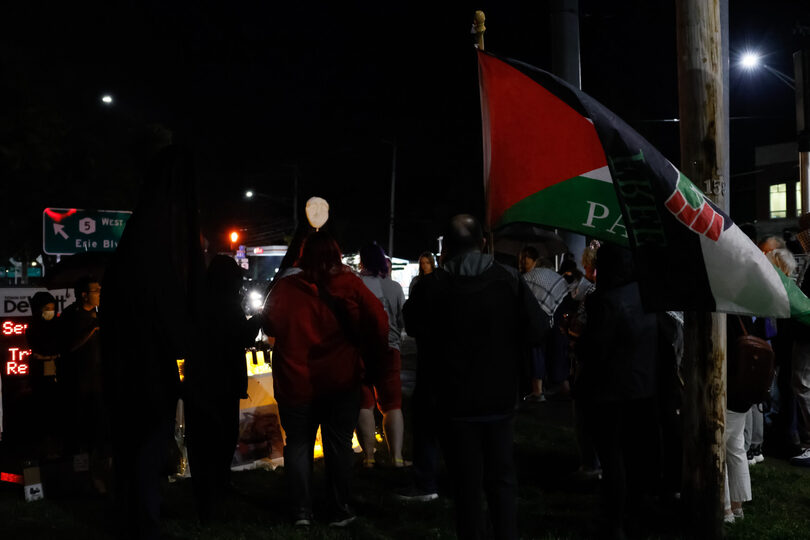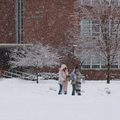Local nonprofits hold Syracuse vigil for Palestinians killed in 2 years of war in Gaza

Two years after the Oct. 7 attack, Syracuse community members gathered at Erie Boulevard and East Genesee Street for a vigil honoring Palestinians killed in the ongoing war in Gaza. Zabdyl Koffa | Staff Photographer
Get the latest Syracuse news delivered right to your inbox.
Subscribe to our newsletter here.
UPDATE: This story was updated at 3:05 p.m. on Oct. 8
Two years after the Oct. 7 attack, Syracuse community members gathered at the corner of Erie Boulevard and East Genesee Street Tuesday evening for a vigil honoring Palestinians killed in the ongoing war in Gaza.
Hosted by three organizations — Syracuse Democratic Socialists of America, the Syracuse Peace Council and Syracuse 4 Palestine and Global Liberation — the vigil met to recognize the “current stage of the genocide in Palestine,” leading organizer Spike Giles said. Organizers named the event a “Sumud” vigil based on an Arabic phrase roughly translating to “resilience.”
“We wanted to honor the Palestinian spirit, and the fact that they refused to give up when so many other people would have given up in the same conditions or lesser,” Giles said. “We’re in this together for the long haul, and the more of us that fight together, the more support we have. And that’s aside from calling attention to the issue itself.”
On Oct. 7, 2023, Hamas, the militant group that governs the Gaza Strip, launched a surprise attack on Israel, killing around 1,200 people and taking hundreds of hostages — 51 of whom have been killed and 48 who are still believed to be held in Gaza.
The assault triggered Israel’s ongoing military campaign in Gaza, which escalated to a prolonged conflict between Israel and Hamas, leading to the deaths of more than 67,000 Palestinians and at least 1,665 Israelis and foreign nationals, including those killed on Oct. 7.
Loud traffic and light rain surrounded attendees as they gathered around a table lit by electric candles and fairy lights. Organizers placed cards and pens for attendees to write prayers to deceased Palestinians, themselves or loved ones, Giles said in her brief opening remarks.
“This is meant to be solemn. We won’t be here for a very long time, we are not here to make noise.” Giles said to attendees. “We did not want this day to pass by without doing something.”
The vigil’s location, at the corner of two major streets in Syracuse, has been the weekly meeting place since 2008 for pro-Palestine protests organized by the Syracuse Peace Council. Ann Tiffany and Ed Kinane, two vigil attendees associated with Syracuse Peace Council, said they hold signs in front of the Dewitt Fire Department every Friday.
“This is an excellent location, because there’s so much traffic that goes by,” Kinane said. “The more of us that could be out in solidarity, the better.”
Lee Cridland, a coordinator for the Syracuse Peace Council, said the vigil is meant to be a safe space for the community to support each other during the war, giving them strength to continue supporting each other.
“There are people who care enough that we can support each other and that hopefully we can turn our government around, which is basically what our job is to do,” Cridland said.
Cridland said the timing of the vigil, 7 p.m., was intentional — allowing students to conceal their identities in the dark amid a trend of disciplinary action from institutions like Columbia University. Many attendees wore masks and keffiyehs, a traditional Palestinian garment, over their faces to conceal their identities.
An SU student, who requested not to use her name due to safety concerns, said she felt “protected” being with other attendees showing their solidarity with the Palestinian people.
“I’m here to honor the martyrs because it’s so pivotal for not only (for) the liberation of Palestinians, but for the liberation of all oppressed groups,” the student said. “As a Black Muslim, it’s important that I stand here in solidarity with my Palestinian brothers and sisters that have been murdered.”
As ceasefire talks continue among world leaders, including President Donald Trump and Israeli Prime Minister Benjamin Netanyahu, attendees expressed mixed hopes about the future of the war.
Giles said she hopes a ceasefire agreement is negotiated in the coming days to grant statehood to the Palestinian people, but fears the United States and Israel will not meet these expectations.
Netanyahu’s settlement expansion plan, which would bisect the West Bank, will make a future Palestinian state “virtually impossible,” Al Jazeera reported.
“My hope is that there are good faith negotiations to make a free Palestine for the Palestinian people, to end the famine, to end the siege and to get aid directly to Palestinians,” Giles said. “I do not believe that our government, nor the Israeli government, has that in mind, which is why we must keep fighting.”





